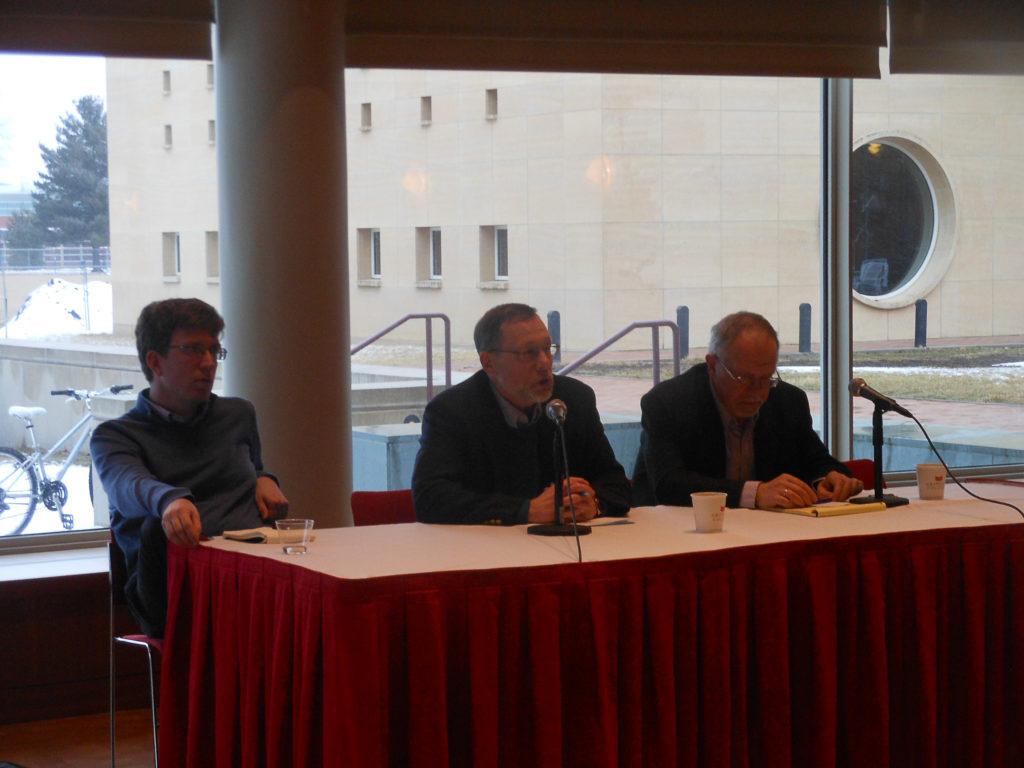On Sunday, March 18, citizens of Russia will cast their votes for the next President of Russia, likely reelecting Vladimir Putin for a fourth term. As alleged Russian electioneering dominates political discourse and media attention in the United States, Grinnell’s Rosenfeld Program in Public Affairs, International Relations and Human Rights sponsored a panel called “The Russian 2018 Presidential Election: Predicting the Predictable?” The panel aimed to develop an understanding of the election, the impact it may have and the issues Russia faces today.
The panel consisted of Professor William Reisinger, an expert on Russian domestic policy from the University of Iowa, and visiting Professor Alexander Kubyshkin from Saint Petersburg State University. It was moderated by Professor Edward Cohn, history, a specialist in the post-WWII Soviet Union and chair of the Russian, Central and Eastern European Studies concentration.

Putin was first elected President of the Russian Federation in 2000, winning reelection in 2004 and stepping down in 2008. But in 2008 an amendment to the Russian Constitution allowed Putin to run in 2012 for another presidential term, this time six-years long, with the possibility of being reelected during the 2018 election cycle. According to the current constitution, Putin will no longer be able to serve as president after the 2024 election. Due to Putin’s lasting popularity in Russia and a lack of coherent opposition, Putin will likely win this election easily. According to Reisinger, Russian polls show Putin winning with 69 percent of the vote, his closest competitor only collecting 8 percent.
Putin has faced widespread criticism for authoritarian governing techniques and undemocratic elections. Kubyshkin acknowledged prior transgressions against democratic institutions, but he argued that “before demanding some democratic reform and structural reforms you have to be prepared for that. You have to prepare your political behavior, your political culture, your management.”
Kubyshkin distinguishes “revolutionary” democracy, undergone all at once and at times creating instability, from “evolutionary” democracy, which takes time.
“[Putin] is a supporter of evolution, not revolution,” Kubyshkin said. Kubyshkin predicts this year’s election will be “the most open” and “the most clear” election in years, but international observers will continue to keep a close eye on the integrity of democratic institutions in Russia.
Events like “Predicting the Predictable,” where students are exposed to Russian politics and culture, are essential, said Kubyshkin, in a time when U.S.-Russia relations are tense and informed by Cold War-era suspicion.
“It’s a real problem because in [the] United States and Russia we still have a lot of stereotype[s] about each other … so I think that it’s a great experience, it’s a great challenge, to be closer, to discuss openly the problems, and the general items, and the common values … for Americans and Russians.”
Despite Putin’s almost certain reelection, Kubyshkin is sure that the upcoming election will not be boring. Assuming Putin wins reelection, both Riesling and Kubyshkin believe Putin will be forced to address the problems now facing Russia, including economic struggles, a lack of public support for the government, but not Putin himself, and the absence of a clear successor to Putin. Some observers, on the other hand, fear that he will extend his power through more constitutional amendments or install a puppet president as his successor.
How Putin responds to foreign and domestic issues and whether he chooses a successor will have a lasting impact across Russia and across the world for years to come.





















































